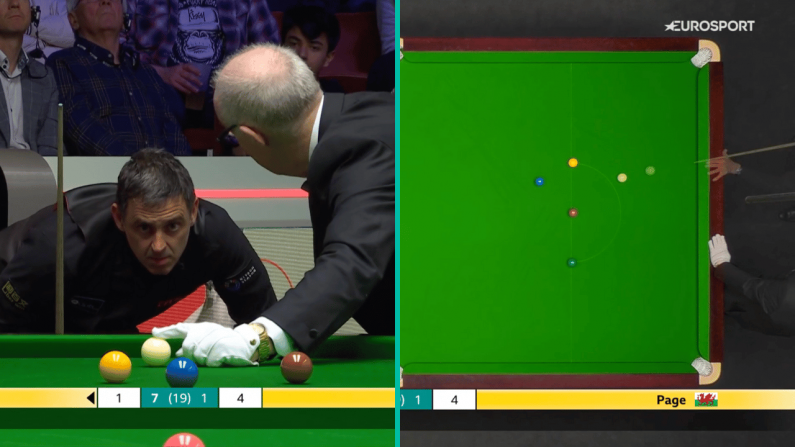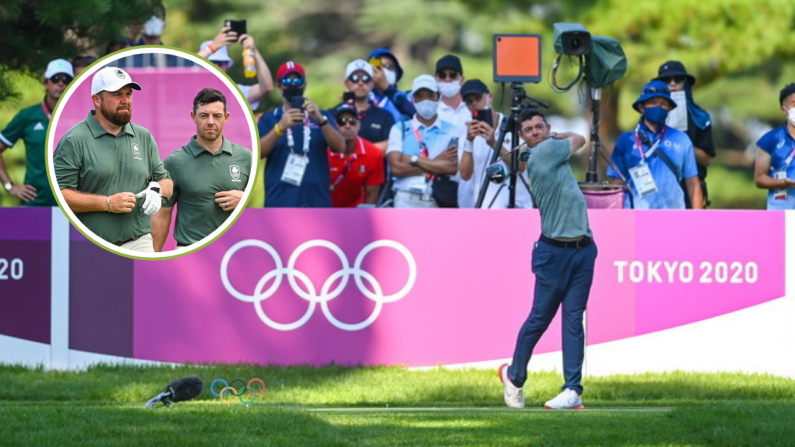The Russians have been benefiting from dodgy judging decisions all week and the Irish aren't the only victims. It seems possible now that the losses of Michael Conlan today and Kazakhstan's Vassiliy Levit may spark a change in the way fights are scored. Still, while we're stewing in the outrage. Here are six of the greatest sporting injustices that spring to our mind. Apologies to any other victims who weren't mentioned. There are so many.
Roy Jones Jr v Park Si-Hun
The gold standard by which all other boxing robberies have subsequently been judged. For instance, yesterday's decision to award the Russian fighter Evgeny Tishchenko the gold ahead of Kazakhstan's Vassiliy Levit was widely described as being on a par with the Roy Jones Jr fight.
Jones, the future Fighter of the Decade for the 1990s, had sauntered his way to the final leaving a trail of battered and outclassed fighters in his wake. Park Si-Hun, meanwhile, was lucky to be in the final.
In the final proper, Jones landed 86 punches compared to 32 from the Korean. Park Si-Hun was given two standing eight counts and was warned by the referee on a couple of occasions. It was one of the more one-sided Olympic finals.
As Jones and Park stood in the middle waiting for the verdict, the Korean corner began jumping up and down and they received a hint that they'd just won. Under his breath, the referee Aldo Leoni whispered to Jones 'I can't believe they're doing this to you.'
Of the five judges, two gave the fight to Jones, the Hungarian judge and the Soviet Union judge (this was the Gorbachev era, of course). The other three, amazingly, gave it to the Korean. The three judges were Uganda's Bob Kasule, Morocco's Hiouad Larbi, and Uruguay's Alberto Duran.
The Moroccan was chased down by reporters for Sports Illustrated. He broke ranks with his other two pro-host country judges and gave the Yanks an insight into what most would agree was the relatively flawed methodology he employed in scoring the fight.
The American won easily; so easily, in fact, that I was positive my four fellow judges would score the fight for the American by a wide margin. So I voted for the Korean to make the score only 4-1 for the American and not embarrass the host country.
The Korean fighter, who never turned pro, looked vaguely mortified by the outcome and, to his credit, rarely missed an opportunity to big up his opponent. He hoisted him up in the air after the verdict. This was a nice attempt at a generous gesture but Jones looked plain uncomfortable. At the podium, Si-Hun gripped Jones's hand and held it aloft. He studied PE and rose to become coach of the Korean youth boxing team.
The IOC were quick to react to the outcry and completed an investigation into the decision a mere nine years later. The three judges who scored the fight for his opponent had been wined and dined by the Korean organisers.
At that point, Jones had largely put the matter behind him and had already been World Middleweight Champion for four years.
Belgium v Ireland
The obvious call would have been to toss in Thierry Henry but in this corner of the office the feeling of outrage about Ireland's treatment in Belgium in 1981 has yet to simmer down.
Even those born after the event should feel it. Ireland were denied a place at Spain '82 due to a couple of scandalous and inexplicable refereeing decisions. Think of all those nostalgia docs we've subsequently missed out on as a result. Camper van tales from Bilbao and Valencia. The Celtic Tiger might have kicked off in the mid to late '80s rather than the mid 90s.
An unusually talented Ireland team, featuring Liam Brady, then running the midfield for Juventus, and Frank Stapleton were plonked in the Group of Death in qualifying. In fact, the phrase 'Group of Death' is entirely inadequate and doesn't come close to doing justice to its perilousness.
Two teams would emerge from a group containing Belgium, France, Holland, Ireland, and the bottom seeds Cyprus. The Dutch reached the last two World Cup finals but had succumbed to another round of infighting and were pinned as the most vulnerable of the trio. The Belgians were a coming team while the French were coming down with midfield talent.
Ireland were in smashing form throughout and beat France and Holland in Lansdowne Road. They drew with the Belgians. They got out of Holland with a 2-2 draw.
In March, they face Belgium.
In an extraordinary article in the Sunday Tribune published shortly before the 2002 World Cup, Paul Howard went to interview Nazare armed with a tape of the game.
He was shown footage of the two contentious decisions. Frank Stapleton had a goal disallowed for reasons that escaped everyone in the ground and everyone watching at home.
And secondly, with time running out and with the 0-0 draw nearly secured, Eric Gerets flung himself to the ground in one of the transparent dives ever witnessed on a football pitch. From the ensuing free kick, Seamus McDonagh punched the ball high in the air and Jan Cuelemans rose above the other Irish defenders and nodded home.
On the former, Nazare changed his mind three times as to why he had disallowed, initially instancing offside. After reviewing the footage which plainly showed that Stapleton was patently not offside, he changed tack.
I think I made a mistake when I told you it was offside. Yes, now I remember. I awarded an indirect free-kick. My hand is up to say indirect. And Liam Brady shoots direct. That is why the goal was disallowed. Nobody touches the ball before it goes in the goal.
If anything, this argument is even less tenable. Stapleton quite clearly volleys the ball in, redirecting the ball into the net. How he does he account for the change in direction. Nazare has a Eureka moment.
The ball hits off me. It hits off my back and goes in the goal. I remember that is why I disallowed it.
Howard moves onto the Gerets incident. Nazare concedes that Gerets is 'clowning' and made 'a spectacle of himself' but he is adamant it was a foul. Conveniently, he argues that this was only visible from the ground and not on the tape.
You can't see it on the tape, but you could see it where I was, from the ground.
South Korea's progress at the 2002 World Cup
We know already how the Koreans always seem to catch a few breaks off officials when they're allowed host major competitions.
They'd never won a match at the World Cup before 2002 but they made amazing progress in 2002.
But then, as England's most celebrated Italophile James Richardson noted on one of those BBC3 compilation shows many years later, there seemed to be a stiff wind behind them.
While the Portuguese were the first to be angered by their treatment in a group game, Italy and Spain were the primary victims.
The Italians, who are rarely slow to suspect a conspiracy, kicked up such a stink that it's easy to forget that Korea's quarter-final opponents were also robbed blind by the refs.
Arguably, Spain were even more hard done by. The Italians found it enormously hard to get next or near a free off the referee with Francesco Totti going down under some stiff challenges without ever hearing a peep from the referee's whistle. Tomassi had a goal ruled out for offside, Italy's fifth such ruled out goal of the competition. Paolo Madini was kicked in the back of the head in the box with no free awarded.
The Ecuadorian ref Byron Moreno became a hate figure in Italy, his name never to be forgotten. He was suspended as a referee after inexplicably playing 13 minutes of injury time in a club match. Once tempers had cooled a bit in Italy, he was invited on a few satirical TV shows where he agreed to be the subject of mockery.
In September 2010, he walked into JFK airport with ten bags of heroin on him. He had fallen into debt and tried to wipe them out in a drug smuggling racket. He was sentenced to 26 months.
The Spanish were kicked and tugged and fouled with more or less impunity all game and on top of that had two goals disallowed for precisely nothing. Korea's run to the semi-final should have been a feelgood story but by the end many fans were happy to see the Germans put a stop to the charade in the semi-final.
2010 Leinster Football Final
It will take a psychologist of greater powers than works here to establish just what was going through Martin Sludden's head when he decided that Joe Sheridan's lunge for the line in the 2010 Leinster Final constituted a legitimate goal.
Sheridan gave one of most memorable post-match interviews in Gaelic football history afterwards when he proclaimed his last-gasp effort 'a perfect goal'.
Notwithstanding the goal's perfection, Joe immediately added the proviso that, 'it was a penalty if it wasn't a goal', a daring strategy which appeared to involve making two separate arguments at once.
The Meath county board PR machine quickly decided that Joe's description of the goal as 'perfect' wasn't quite tenable, and they offered their sympathy to the Louth county board if not a replay. But the memory of Joe's post-match stubbornness inspires us still.
The grief-stricken Louth woman captured afterwards evoked great sympathy in the nation at large, though this was squandered by her county-men who proceeded to jostle a frightened looking Sludden on his harrowing march towards the tunnel.
Shirley Babashoff
Many great athletes have been stymied by the most sophisticated doping programmes known to man. Our own Sonia finished 4th in the 3000m at the 1993 World Championships, the first three spots being occupied by three Chinese runners. One of that trio recently testified that the Chinese middle distance runners in the early 90s were forced to take 'large doses of illegal drugs'. As revelations go, we've heard more shocking ones.
Of course, before we go any further, we do note that there were a couple of American swimmers who complained of being robbed in Atlanta in 1996.
However, the most famous example of a clean athlete being shafted and robbed by rampant doping was Shirley Babashoff, the women lampooned as 'Surly Shirley' by her home press during the 1976 Olympics in Montreal.
Renowned as one of the greatest swimmers of all time, Babashoff had to make do with four silver medals in the individual events.
She finished behind East Germans in all four races. She acquired her alliterative nickname on account of her loud accusations of drug taking against the muscular East Germans.
Her last chance for a medal came in the 4X100 metre relay. The East Germans were expected to win but Babashoff swam a stunning last leg to carry the US to victory.
She never swam in the Olympics again.
France v Ireland, 2009
We hardly to write anything more about this. Suffice to say, when the rest of the country was demanding a replay to the Ireland-France tie, this writer joined a facebook group which was founded that week and which called for a replay to the 1992 Munster hurling final. Seriously, how was Tomas Mulcahy's goal allowed? Not the first dodgy one he scored either. Am I right Galway fans who remember 1986?








